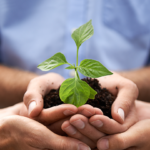“There can be no deep disappointment where there is not deep love.”–Martin Luther King
What does it mean when you say you love someone? It means you accept the other person for who they are—the good, the bad, the ugly—all of it, unconditionally.
Have you ever shown that kind of unconditional acceptance towards yourself? Very few of us are able to view ourselves through the lens of unconditional love.
Self-love as Dharma
Ayurveda believes that your Self chose your body to fulfil your life’s purpose; it is crucial that you honour your life as a gift from the universe. The body you inhabit is an essential part of your journey as it is the carrier for your soul. Which is why it is important to express love towards all aspects of yourself.
Self-love has been a principal tenet of Ayurveda for thousands of years. While self-love might look different for everyone, it’s rooted in one thing—acceptance.
In order to carry out your life’s true purpose, which is Dharma, you need to be able to accept yourself. To make a difference in the world either through acts of service, creativity, or sharing knowledge, you must know and understand your own qualities in a better way. The path towards realizing your Dharma starts with self-love.
What is self-Love?
At its core, self-love is an unconditional acceptance of yourself. Your positive qualities, such as kindness, generosity, drive, etc., and your negative qualities such as jealousy, anger, and other aspects of your nature that you would like to change. Accepting one’s qualities both good and bad helps you bring your mind, body, and spirit into equilibrium.
Self-love is about appreciating oneself completely—mentally, physically, and emotionally. Ayurveda teaches us the importance of alignment in our mind, body, and spirit. A body is considered to be in a Swasth Vritti, a Healthy State, when there is a balance in the mental, emotional, and physical aspects of the being.
When there is a build-up of excess ama—be it physical, emotional, or mental—the mind falls into a trap of self-loathing and sabotage. Unlearning those thought patterns can take some time, however, self-love is the key.
Ways To Build Self-Love
Life in the 21st century is filled with screens, both large and small, that compete for our energy. The art of “being” gets forgotten and present moment awareness is seldom accessible. This misalignment with the present moment and constant worry about the future or regret about the past depletes the Ojas—the vitality that is the essence of all Dhatus (tissues).
The Ayurvedic lifestyle teaches us to nurture our body in order to nourish our mind and in turn raise the level of our consciousness. When Ojas is present, you are able to view the world from the lens of abundance. However, when Ojas is depleted, your capacity for self-love is hindered and you begin to view the world from a mindset of scarcity.
Self-love is an inseparable part of Ayurveda. The Ayurvedic practices of Yoga and meditation are based in mindfulness. Being mindful of your breath, understanding the way each breath feels in different parts of your body trains your mind to be in tune with your body.
Ayurvedic methods of treatment are focused on reinstating the balance between our doshas (Vata, Pitta, Kapha) and the five elements that govern the body.
Snehana
“Sneha” means “love” and it also means “oil” in Sanskrit. It is poignant that the word for love and the word for oleation are the same! Snehana is an Ayurvedic treatment that is the application of oil internally or externally. Herbal oils saturate the body and loosen up the Ama or toxins that are accumulated in the Dhatus or tissues.
Abhyanga
Abhyanga is another crucial Ayurvedic treatment which is an oil massage of the whole body. Oil massage, when incorporated as a part of a daily ritual, becomes an act of self-love. Make sure that you choose the oil that is suitable for your particular dosha. Abhyanga helps not only in getting rid of pent up Ama but also in showing love and care to your internal organs.
Panchakarma
Panchakarma stands for “Five Therapies”. It is an Ayurvedic Rejuvenation Therapy which is the most effective method of alleviating stress and fighting against functional impairments of the body. It helps replenish the tissues with nutrients that are crucial for good health. It also enables the body to eliminate disease-causing toxins.
Reframe Negative Self-Talk With Kindness
Negative self-talk is an enemy of self-love. Practicing self-love is about accepting the negative and befriending it. Understand that the negative self-talk stems from your high expectations and hopes from your own self. If you didn’t love yourself enough, you would not be frustrated when you fail. It is crucial to note the good intention behind the negative self-talk. Be careful though! Don’t let it take control over you and run you down an endless spiral. Redirect it towards kindness.
Benefits of Self-Love
Building resilience: Consistently showing yourself love and kindness builds resilience. It helps you to draw strength from within when faced with adversity. Research shows that practicing self-love regularly has helped people recover faster from trauma. It also aids in building healthier coping mechanisms in light of failure.
Making healthier choices: Self-love is about accepting your emotions for what they are. It’s about prioritizing your own physical, emotional, and mental health. When you let the love for self in, you give yourself the permission to make healthier choices.
The unhealthy behaviour patterns that have been built up over the years start to unravel and give space to new thoughts and actions that in turn help you in realizing your true potential.
Self-love empowers you to hold yourself in high esteem making you more prone to choosing things that nurture you instead of heeding those that harm you.
Choose to stretch your body before picking up the phone as soon as you wake up. Actively avoid substances and people that deplete your energy. Make sure that you practice meditation and mindful breathing. These are all ways in which you can make healthy choices on a daily basis.
Over a period of time, these choices will become habits and you would have established rituals of self-love that enrich your body, mind, and soul.






